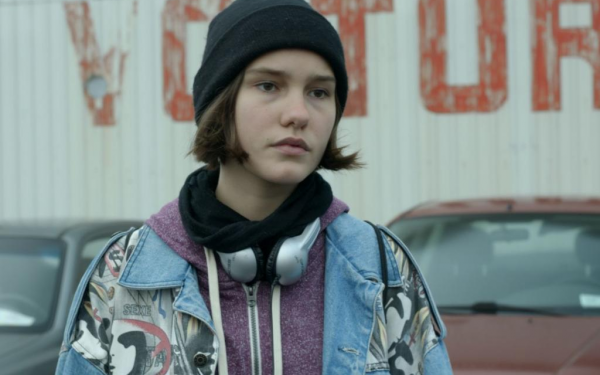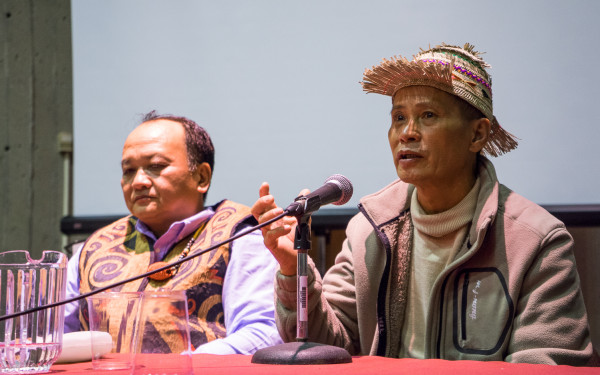Montreal’s Stop Motion Festival an Animated Success
Fans, Creators and Newbies Alike Come Together for the Eighth Edition
Animated—that’s the best way to describe Érik Goulet, the founder of Montreal’s Stop Motion Film Festival.
During the event this past weekend, he skipped around the de Sève Cinema in Concordia’s downtown library building, playing host, organizer, and lifelong stop motion fanboy all at once.
“I’m young at heart,” Goulet said in an interview between film screenings. “I’m 49 years old but I love stop motion, I love going to the theatre—I love going to Toys R’ Us.”
The Concordia part-time instructor’s enthusiasm became almost a sideshow from the on-screen talent displayed in the festival’s eighth edition. There were 48 films entered into this year’s competition—which were split between three categories: academic, independent and professional.
The farthest submission came from Japan, while the closest was from Montreal. A majority of the films came from either the United States or Europe. There were two judges sitting among the audience during screenings, which played successively for each category, lasting about an hour each.
Claude Robinson, an artist known for protecting Canadian copyright, joined Sylvie Trouvé, a Montreal-based animator and filmmaker who animated for the 2015 animated blockbuster, The Little Prince. The pair served jury-duty for the first time, sitting alongside each other mid-theatre to measure the crowd’s “pulse,” as Goulet explained to the audience before each showing.
“It’s nice to be able to sit down and watch a bunch of films,” Trouvé said after the second academic competition showcase. “Student films are amazing—I love them because they really are unique and come from the heart and are not outside-influenced.”
Eight Years and Counting
It was on a car ride back from the Ottawa Film Festival in 2007 when Goulet first got inspired to create a festival dedicated solely to stop motion films. The Ottawa event had a wide selection of animation films he liked, but Goulet remembered complaining to his wife Veronica about a lack of the presence his first love—stop motion.
“My wife turns to me and says, maybe you should start your own festival, then,” Goulet recalled. It wasn’t until the summer of 2009—after a company merger and subsequent “fortunate” layoff—that Goulet had enough free time between contracts and teaching to finally work on the festival.
With only three months between July and the festival’s premiere in October, the 2009 edition received 113 worldwide film submissions and featured 60 of them, according to Goulet—but to little fanfare. There was a lack of promotion, Goulet said, because he wasn’t sure how many directors would submit work.
The first festival was well received by friends and family alike, and a second edition happened the next year. By the time of the fifth edition, Goulet explained that they became a non-profit organization, which meant they could apply for government grants and find sponsorships more easily. “I’m here for the long run,” he said. “I feel responsible for the stop motion community I’m trying to grow in Montreal.”
“I feel responsible for the stop motion community I’m trying to grow in Montreal.” —Érik Goulet, founder of Montreal’s Stop Motion Film Festival
The animation community in Montreal—especially for stop motion—is small but thriving despite its size, according to Trouvé. “The festival and Erik really put it on the map,” she said.
Inside the Experts’ Minds
The festival kicked off on Friday with a talk by the duo behind the Clyde Henry Productions studio in Montreal, Chris Lavis and Maciek Szczerbowski. Best known for their 2008 Oscar-nominated short, “Madame Tutli-Putli,” the pair gave an unrehearsed presentation on their process of using found items to create stop motion. It was a perfect start to the festival for those unaware of the nuance involved in the niche genre.
In between nerdy insider jokes that fell flat—a fact they acknowledged and laughed off—Lavis and Szczerbowski provided insightful gems to their craft and technique. In stop motion, material becomes storytelling, Szczerbowski explained. He recounted how one time he saw broken glass on St. Laurent St., thought to pick it up, then thought better and continued walking, only to reconsider his decision a block away and go back to get it.
1web_900_600_90.jpg)
They showed images of their studio full of puppets, naked armatures, and different sets. Having a huge collection of found items from the street or elsewhere is essential to stop motion animation, they said, because the objects can speak to you and inspire.
“Sometimes they say, ‘use me,’ ‘don’t use me,’ or even ‘piss off,’” Szczerbowski explained to the audience.
Showcasing Student Work
Concordia has a class on stop motion animation in its Mel Hoppenheim School of Cinema, taught by Goulet. When asked about the program, Trouvé said Concordia places more emphasis on creating filmmakers than animators and that they need to provide more technical training beyond Goulet’s course.
This lack of resources hasn’t stopped recent Concordia students from getting work in the industry, though. Six of them worked on The Little Prince with Trouvé, and Goulet was the one who recommended them. “I’m really proud because they got the talent,” he said. “[I received] lots of compliments from the [film’s] production team.”
“I can see in class who’s good at constructing puppets or animating or constructing sets or miniature pieces.”
Many of Goulet’s former students tend to keep in touch with him on a professional and personal level. The team that coordinated the festival this year boasted five past students. “I work with them on contracts,” Goulet explained. “It’s more than just former students. They’ve become my colleagues—they’ve become my friends.”
One might expect that his former students feature heavily within the festival’s competitions, but Goulet said this isn’t the case. “It’s not just that they’re former students of mine that they get a free pass,” he continued. “They’ve got to have the talent and [show] they can compete with films all over the world.”
One Concordia graduate featured in the academic category this year: Pascal Huynh. His three-minute short, “My Invisible Mother,” was a hybrid between stop motion—using claymation and cardboard sets—and documentary-style interviews. “Pascal is one of the rare who has a film being presented,” Goulet commented. “The quality of the work is awesome.”

web_900_600_90.jpg)




